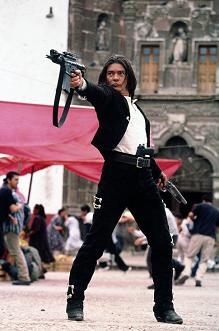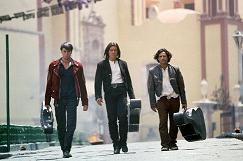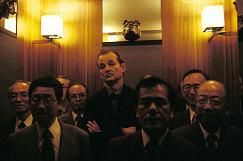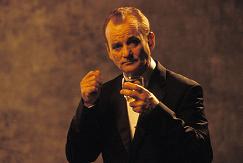|
Joker Recommends
|
-Top 20 List
-House of Flying Daggers
-The Aviator
-Bad Education
|
|
Yun-Fat Recommends
|
|
-Eight Diagram Pole Fighter
-Los Muertos
-Tropical Malady
|
|
Allyn Recommends
|
|
-Eternal Sunshine of the Spotless Mind
-Songs from the Second Floor
|
|
Phyrephox Recommends
|
-Top 20 List
-Design for Living (Lubitsch, 1933)
-War of the Worlds
-Howl's Moving Castle
|
|
Melisb Recommends
|
-Top 20 List
-The Return
-Spirited Away
-Spring, Summer, Fall, Winter...And Spring
|
|
Wardpet Recommends
|
|
-Finding Nemo
-Man on the Train
-28 Days Later
|
|
Lorne Recommends
|
|
-21 Grams
-Cold Mountain
-Lost in Translation
|
|
Merlot Recommends
|
-Top 20 List
-The Man on the Train
-Safe Conduct
-The Statement
|
|
Whitney Recommends
|
|
-Femme Fatale
-Gangs of New York
-Grand Illusion
|
|
Sydhe Recommends
|
|
-In America
-Looney Tunes: Back In Action
-Whale Rider
|
|
Copywright Recommends
|
Top 20 List
-Flowers of Shanghai
-Road to Perdition
-Topsy-Turvy
|
|
Stennie Recommends
|
Top 20 List
-A Matter of Life and Death
-Ossessione
-Sideways
|
|
Jeff Recommends
|
|
-Dial M for Murder
-The Game
-Star Wars Saga
|
|
Lady Wakasa Recommends
|
|
-Dracula: Page from a Virgin's Diary
-Dr. Mabuse, Der Spieler
-The Last Laugh
|
|
Steve Recommends
|
-Top 20 List
-Princess Raccoon
-Princess Raccoon
-Princess Raccoon
|
|
Jenny Recommends
|
|
-Mean Girls
-Super Size Me
-The Warriors
|
|
Lons Recommends
|
|
-Before Sunset
-The Incredibles
-Sideways
|


|
(c)2002 Design by Blogscapes.com
|
The Blog:
|
Cabin Fever
(Dinky spoilage ahead -- nothing major gets revealed, but be cautious anyway.)
Another day, another highly anticipated horror film goes pffft. This one, in particular, is absolutely maddening -- by all rights, it should work. Occasionally it does work, beautifully. But it's pretty clear from the outset that Eli Roth is a first-timer, and an accumulation of novice mistakes sink this puppy.
The premise is simple and well-worn: College kids go to a remote backwoods cabin and encounter something nasty; fun with blood 'n' guts ensues. Certainly, the film wants to be a throwback, a homage/companion piece to some acknowledged horror classics. No film with cabin-based hijinx can escape comparisons to "The Evil Dead", naturally, and there's also visual references to "The Texas Chainsaw Massacre" and "Night of the Living Dead" (among others). Unfortunately for us, though, Roth's primary source of influence seems to have come from another heralded '70s monster -- "The Last House on the Left". To his credit, Roth imports the man's-inhumanity-to-man theme that gave "Last House" what small redeeming quality it had. It's significant to note that the loosing of the virus into the local reservoir could have been avoided had these five kids just helped the infected man who stopped at their cabin instead of chasing him away with baseball bats and torches and such. There's a neat parallel to that scene later when one of the kids becomes infected and drives into town looking for a doctor; the hostility he meets lies somewhere between callousness and just desserts. But Roth also nicked something else from "Last House", something a little more ill-advised: hick humor.
That's right, hick humor. Lots of it. In places it really shouldn't be. This movie is a tonal nightmare. It's bad enough that the five kids are jackasses for the first third of the film, thus inhibiting any kind of sympathising or identifying with them, but at least that can be overcome. But what are we to do with the other superfluous characters that populate this movie? Did we really need the friendly shopkeeper who may have uttered a racial slur, for example? Or the obnoxious skater with the big bag of weed? Or how about this film's most grievous offense -- the character of Deputy Winston, whose initial scene is so weird and off-putting that I figure it had to be a sick joke on the audience a la Tom Green. But no, Winston is meant to be taken seriously (or at least as seriously as his ridiculous character can be), and he has a major hand in the climax. Which is just wrong, if you ask me.
The biggest shame is that there's actually good stuff buried under this mountain of crap. When the film strips down to basics and actually concentrates on its main characters rather than these daffy asides, it's pretty good. There's some impressively nasty makeup FX and the latter half of the film (involving the rampaging virus, some angry rednecks and a very cheesed-off German Shepherd) works up a nice creepy vibe. The acting isn't that bad, either (though Joey Kern is essentially rehashing his sarcastic stoner kid from "Super Troopers"). I was especially impressed how the character of Bert slowly progressed from standard-issue-dim-jock-asshole into a sympathetic figure willing to stand by his friends. But after all that, we're left with about forty minutes of interesting stuff and fifty minutes of crap. (The last scene, in particular, is godawful.) I definitely think Eli Roth is a talented guy, but he's also seriously undisciplined. Next time, dude, concentrate on the gore and leave the hicks at home.
Toronto International Film Festival 2003, preliminary notes. (Reviews of specific films to follow, starting later in the week)
Other reviewers (the CBC and the Globe and Mail among them) have noted the preponderance of films dealing with mortality during this year's TIFF. It certainly struck me, when four of my first five films (Arcand's Invasions Barbares; Thom Fitzgerald's The Event; My Life Without Me with Sarah Polley and Mark Ruffalo; Sarah Gavron's This Little Life) included: three terminal illnesses, two assisted suicides, and one very premature baby fighting for his life. Later on, there are also: one sudden disappearance (and presumed murder) of a young boy; one heart transplant, one heart failure, one case of pancreatic cancer. The dark comedy/drama Wilbur Wants to Kill Himself (from the director of Italian for Beginners) includes - surprise! - numerous suicide attempts. Margarethe von Trotta's Rosenstrasse, set in WWII Berlin, looks at lives threatened by the Holocaust; Marcelo Pineyro's Kamchatka, is set during the early months of the Argentinian military coup of 1976 - an event that left (estimates vary) 9,000-30,000 people "disappeared". Michael Haneke's Le Temps du loup, is akin to a French After 28 Days.
The theory is that this wave of films includes ones predominantly scripted in the shadow of 9/11, with screenwriters dwelling on themes of loss, death, and the question of how one lives in the shadow of death (whether one's own, or a loved one's). Whatever the merits of the theory, it was certainly a very dark crop of films. Hence, I appreciated all the more the cheerier films of the 33 seen: newcomer Jane Weinstock's Easy, Richard Curtis' ensemble piece Love Actually (both romantic comedies); and Coppola's Lost in Translation. One "smaller" film The Station Agent, and a kick-ass martial arts drama Ong Bak Muay: Thai Warrior rounded off the list of notable titles.
Special Mention to AGF, the mutual funds company and a major TIFF sponsor, for their series of trailers. In one, an airline steward, while giving the pre-flight safety instructions, segues into "full thespian" mode. A second has a legal stenographer, when requested to "read the last few lines back", giving a dramatically scripted - and entirely fictitious - account of the court proceedings. In a third, a private investigator, presenting a client with videotaped evidence of his wife's infidelity, prattles on about how he tried to do "a sort of homage to Godard...looking for an experimental quality". All finish with the (titled, but unspoken) tag lines: "What do you love to do? Why aren't you doing it?" Imaginative, humorous, and effective. I hope they give the ads wider distribution.
-copywright.
Once Upon a Time in Mexico
Once Upon a Time In Mexico ruins a terrific title, a movie name that’s part of a legacy, one that suggests the iconic majesty of the grand epics of Sergio Leone, later reinvented by Tsui Hark. In the opening credits Robert Rodriguez is given the knighting of Hyper-Auteur,  having “shot, cropped, scored,” produced, written, and directed the film-a new part of the constantly evolving story of the mariachi, the guitar carrying gunslayer from Rodriguez’s debut l  ow-budget action film El Mariachi and his later, bigger budget sequel Desperado. Antonio Banderas once again picks up the guitar and the gun to reprise his stoic Mexican hero, and along with him is Rodriguez’s usual cast-Selma Hayek, Cheech Marin, Danny Trejo, some of which are resurrected, literally, from Desperado-and they are joined by an offhand, sardonic Johnny Depp, a sexy Eva Mendes, a Mexican Willem Dafoe, a typically slimy Mickey Rourke, and too-good-to-be-in-this-movie Ruben Blades as a demented ex-FBI agent. Around them all is a thread of coherent plot as thin as a spaghetti strand; but one thing is clear, everyone is out for vengeance. There is about to be a coupe on the Mexican presidency by a rouge general funded by Dafoe’s drug czar, and everyone wants a piece of the action. Hayek, Banderas’ girl from Desperado, is gunned down in flashback by the general and Banderas vows revenge. The FBI agent wants to avenge a dead comrade killed by Dafoe, and Depp, a CIA agent, is doing the American thing of trying to orchestrate the killing of everyone by everyone else.
Not that any of it comes together; despite the film’s $30 million budget and economic use of DV cameras (not to mention its almost one man crew) Once Upon a Time In Mexico screams low-budget almost as loudly as it hollers “troubled shoot.” Each character seems separated from the other not through actual space but by an off-and-on shooting schedule. That Hayek, a major character of the previous film, is quickly killed off in flashback and Depp’s interaction with the rest of the cast consists of cellphone calls begins to nip at the idea that all of these actors were doing this movie as a favor and could not all show up on the same day. The prototypical sleazy Mexican action film that Once Upon a Time in Mexico is trying to emulate never comes off sleazy enough, both due to the digital gloss that fails to convey the moral grime of everyone involved, but also because the film’s remarkable cast is each going off in their own direction. Ruben Blades pulls a Giancarlo Giannini from Hannibal, playing a deep and interesting roll so well as to momentarily jump out of the bewildered source material, and Depp, who in 2003 seems to be adamant about hijacking every movie he is in by subverting his roles with the most sardonic, clever, funny, and damn-cool performances ever seen, upstages everyone as usual.
Impressive stuntwork is marred by Rodriguez’ inept ability to deliver action punch-lines, and Once Upon a Time in Mexico only really ignites when it delves into the grotesque: Dafoe’s  brief role as a Mexican (amusing subverted later by an underused plastic surgery plotline); Depp waltzing around Mexico with a false left arm and a shirt that declares C.I.A. is big, bright letters; and finally the coup-de-grace of Depp’s knockout year in the movies: the agency puppetmaster is turned into an awesome cross between the blind swordfighter Zatoichi and the father and son samurai pair Lone Wolf and Cub. Whether the film is the result of studio tampering or simply problems resulting from Rodriguez trying to recreate the independent energy of his first film, Mexico’s ridiculously hackneyed editing structure bares a creeping similarity to Leone’s initial theatrical release of Once Upon a Time In America. But unlike that now-restored classic, little of the material in Rodriguez’s film has the ability to overshadow the film’s many, many technical flaws. Depp’s performance is not large enough to do for Mexico what it did for Pirates, and if Desperado did not prove to everyone that Rodriguez really is not the next John Woo, Mexico is the nail in the coffin both for the mainstream auteur’s action career, but also his attempts at a return to his roots.
Lost in Translation
In a movie where the grotesquely tall Bill Murray goes to Japan one would expect endless jokes re: his height compared to the notoriously shorter  inhabitants of the country. Thankfully Lost in Translation, writer/director Sofia Coppola’s second film, abstains from the obvious and keeps the visual gags down to just one brief elevator shot and the fact that Murray walks around Japan in shoes so large and colorful they could easily been for a clown. Coppola keeps much the humor the same throughout the film; she effortlessly keeps a delicate, softly humorous tone throughout. Murray play Bob Harris, a middle-aged actor going through a decline both in his career and his life, having just traveled to Japan to shoot a whiskey commercial for $2 million, and perhaps to escape his family. Away from his wife and kids, jet-lagged and without sleep in Tokyo, no one seems to speak real English, nor understand how to communicate to him-the commercial director instructs Bob to be more intense, more intense, and the photographer directs him to imitate the Rat Pack and Roger Moore). Invariably, Bob ends up drifting to the hotel bar night after night. There he spies Charlotte (Scarlett Johannson), another lost soul, albeit much younger, alienated from her husband of two years and finding little inspiration from within-where she tries to connect to her soul via music and self-help intructions-or from Japan, where she visits the gamut of tourism, from ancient shrines to digital arcades.
Coppola’s film is very unassuming, and she scripts a story that plays out just as one expects it; with Murray and Johannson both tied down by marriages that are only hinted at as being troublesome, their past lives obviously  tie them down too much to become physically romantically involved, and of course there is always the matter of their ages (Charlotte guesses that Bob is going through a midlife crisis). So instead of playing the situation off to an unlikely direction, Coppola sticks to keeping her film as tonally perfect as possible. Mixing her ethereal soundscape of Virgin Suicides with good-rock filtered through bad-karaoke and achieving a surprisingly warm visual look out of cool colors by cinematographer Lance Acord, Coppola places her two wayward souls in the most foreign of environments but keeps them nestled snuggly in a unique world of low-key humor, laconic romance and beautiful environments. Murray milks all he can from his naturally tired and droopy look, and like much of the film itself, he underplays his comedy to the point of minimalist gesture, which keeps the laughs from being too loud, and the jabs at the Japanese from being unreasonable. Scarlett Johannson is loved, with every due cause, by Coppola’s camera, which seems to give her a soft-focus flourish every time Johannson takes a step or looks out a window. Neither Zwigoff nor the Coens do for Johannson’s young beauty what Lost in Translation does (even the film’s opening shot is a loving tribute to the girl), and she rightly has shared billing with Murray. There is no mistaking why her maturity and talent as an actress has attracted the top independent talent, and no mistaking why her warm, delicate longing in Lost in Translation attracts Murray in the most natural of ways. She simply is too good to resist.
If  the film abstains from achieving the kind of humble transcendence it goes for, it is probably due to Tokyo. No fault of the city itself, for it does an appropriate job of isolating the duo in a lonely purgatory away from normal human contact, as well as loved ones. The film obviously loves the city, if not the country, a great deal, but Coppola’s enjoyment feels only superficial. Japan could be a stand-in for any foreign country, and what it really needs is a personality that changes with the characters; what starts out as alien and untranslatable eventually becomes a special place where Murray and Johnnson’s friendship uniquely exists. A deeper understanding, appreciation, or study of the environment is needed to truly push Lost in Translation into a deeper place, though as is the film is a soft-spoken joy. If Japan and Tokyo do not stand out enough to place intelligent thought on the relationship between Bob and Charlotte, it is only in keeping with the film’s minimalism in its every movement. Sometimes, though, strict adherence stops one from achieving possible greatness.
Question of the Week
So much opened here this weekend, yet I only managed to see one film, The Secret Life of Dentists; between friends, work, and the weather, I haven't yet to go to the Cinematheque (so many wuxia pian slipping away); and to top that off, my DVD player is officially kaput (though I'm going to get me a new and improved one some time early this week), so excuse me if this question of the week appears lazily conceived, because it was...
Though it is early in the decade, create a list of the Top 10 films of the 2000s, providing rationale for each choice
Not too hard, and it should be interesting, as a canon, whether official or unofficial has yet to be created for this decade. This question is open to all blog members and readers, but only one list per person. Toodles, off to watch the Conan O'Brien 10th Anniversary Special.
UPDATE I've decided that I'm going to tally up all of the lists to create something of an unofficial Milk Plus writers/readers canon (i.e. the #1 film will get 10 points, the #2 film will get 9 points....), so jot down your list ASAP.
UPDATED UPDATE Polling ends at 9pm CST on 9-23, so if you want to vote, you better hurry up.
|
|

